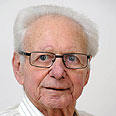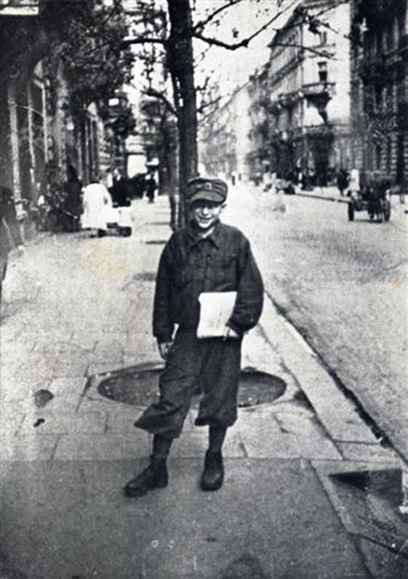
Holocaust survivor Peretz ‘Pavel’ Hochman, a fighter in the Warsaw Ghetto uprising against the Germans, died of cancer on Sunday. He was 86. Next week he was supposed to light a torch at Yad Vashem’s Holocaust Memorial Day ceremony. His widow will light the candle in his place.
Related stories:
- Boy saved by Schindler writes book
- Abusing Holocaust memorial days
- Auschwitz suitcase reveals parents' fate
Hochman’s story was told in the book “The Cigarette Sellers of Three Crosses Square” by Joseph Ziemian. He was born in 1927 in Warsaw, the fourth of eight brothers.
With the establishment of the Warsaw ghetto, his older brothers were left outside the ghetto, where they pretended to be Christians, and the parents, Hochman and his younger brother were left inside the ghetto.

Peretz Hochman in Warsaw (Photo: Yad Vashem)
As the situation worsened, the two brothers left the ghetto, pretending to be Christians. They survived by singing on the streets, and selling cigarettes and newspapers in Three Crosses Square in the city. Most of their customers were Germans, among them SS officers.
At the same time, the boys smuggled food and clothes to their parents in the ghetto. “We slept in stairwells, we had to be quiet,” Hochman told Yad Vashem staff. “After a long period, we got shoes made of wood, but they made a lot of noise. We found our own solution – to glue strips of tires to the soles.”
Their father, Benjamin, died of starvation in the ghetto; their mother Miriam was shot to death during the action of summer 1942.
‘Looked a German straight in the eyes’
When the rebellion broke out in April 1943, Peretz’s younger brother was in the ghetto. He managed to escape to the Polish area of Warsaw and the two brothers managed to meet up.Hochman’s son Rami told Ynet his father’s story. At 12-years-old he met a Polish acquaintance in Warsaw, who promised to hide him in the countryside. ‘Instead of taking care of him, the man took him directly to the German police. My father looked the German officer directly in the eyes, crossed himself and said he was willing to strip so they would see he was uncircumcised, which was obviously a lie.”
An umderground comrade, Joseph Ziemian, one of the Jews who remained in Warsaw after the ghetto uprising and survived by pretending to be a non-Jew, made the brothers and their friends fake identity cards, which helped them for a short time. On the night of the Warsaw uprising, the two brothers joined the Polish resistance.
‘As far as my brother and I were concerned, volunteering for the Polish underground was our way to get revenge on the Nazis. Anytime they needed someone to undertake a complicated task, I volunteered. My commanders held me up as an example of the dedicated soldier. All I wanted was to hurt Germans, get revenge. My life was not important to me. In a certain way, something inside me was already dead, so I was not afraid of death.”
At the end of the rebellion, the remaining rebels were sent to POW camps in Germany, Hochman and his brother among them. With their release, the two returned to Warsaw, where they found their older brother, Leon. They attempted to reach Israel by way of sea.
In July 1946, the British caught their ship the “Byria.” Hochman and its other passengers were imprisoned in Atlit, and released after a few months. Upon his arrival in Israel, Hochman joined Kibbutz Shaar Hagolan. He was injured serving in the Ninth Regiment of the Palmach’s Negev Brigade during the War of Independence.
Hochman is survived by his wife, Sima, three sons and six grandchildren.
Said his son Rami Hochman, “My father was an amazing man. When you think of a 12-year-old boy with no family, barefoot and hungry, you think to yourself, ‘where do you sleep? How do you survive?’ If you follow his story, you find a boy full of gumption and humor, who faces, on a daily basis, questions of life and death, in a way that is difficult to comprehend.”
“In Israel, our father built his life against all the odds. His is a classic story of Zionism and survival. It is sad that he did not make it to light the flame, he was really looking forward to it.”
Rachel Barkai, Yad Vashem’s Director of Commemoration and Public Relations expressed surprise and sorrow, and said that Hochman’s widow would light the candle in his place. The event will also include a showing of a film made on Hochman’s life.
Sima, Hochman’s wife, said, “We were married for 60 years. After everything he went through during the war, he was so proud of the family he raised in Israel, children who continued the tradition of his fight and became paratrooper officers. Since he passed away, I cry all the time. I cannot digest his death, or the fact that I will light the flame in his stead. It was to have been his right, and now I must do it. It is a difficult feeling.”
- Receive Ynetnews updates
directly to your desktop















